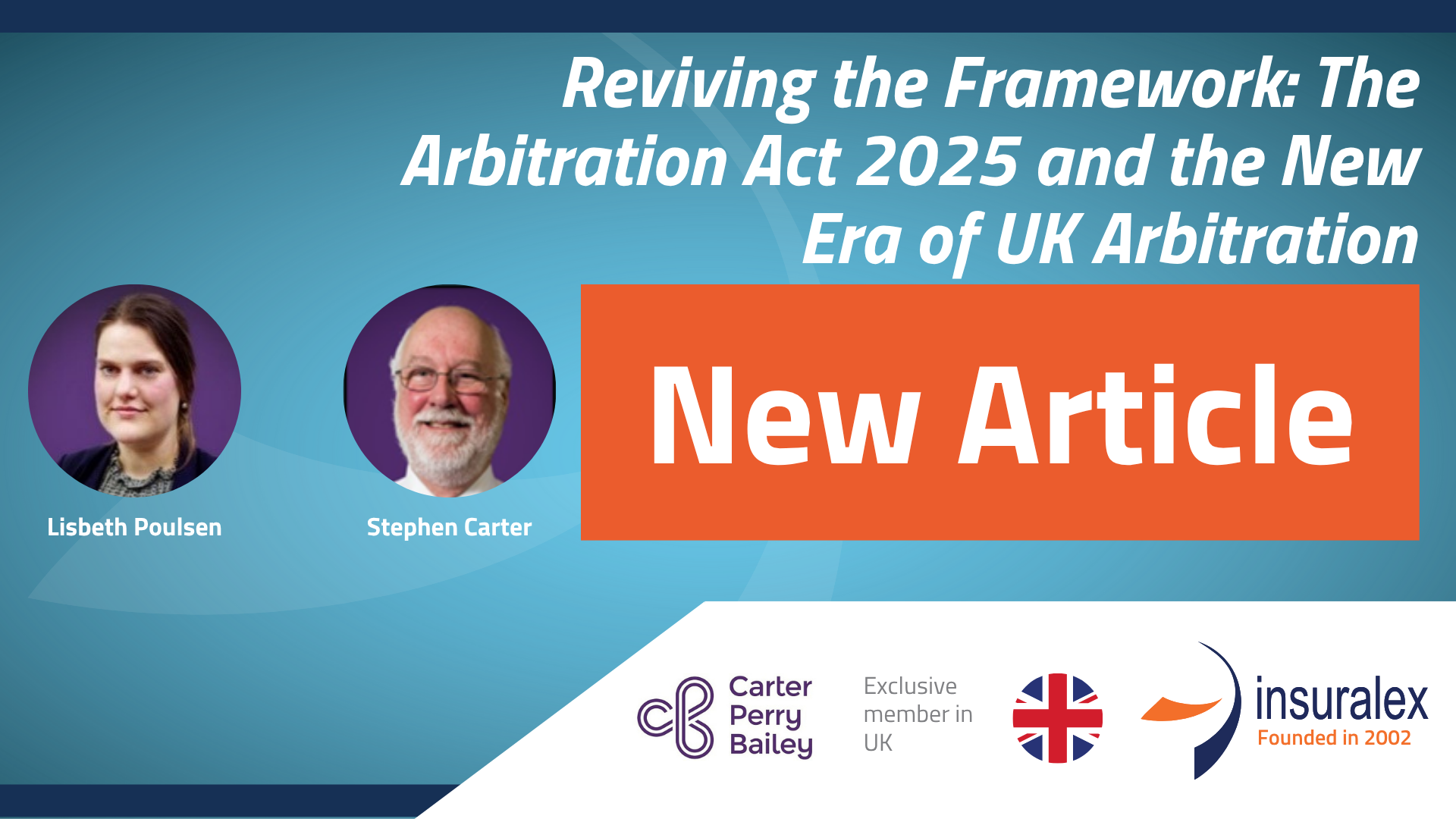
England is widely recognised as a leading choice for international arbitration. There is a strong tradition of arbitration in the jurisdiction with institutional support and a robust judicial record of upholding party autonomy. Building upon a sturdy foundation, the new Arbitration Act 2025 (“the 2025 Act”) was enacted earlier this year as “legislative maintenance” rather than a statutory re-build. The objective is to preserve England’s status as a premier global seat for arbitration that balances commercial realities with sound procedural traditions. It is a dynamic evolutionary instrument seeking to enhance the efficiency of the procedural process where possible, whilst also clarifying some ambiguities that had occurred under the previous Arbitration Act 1996.
Codification of Principles developed in Case Law
The 2025 Act incorporates a number of clarifications in respect of ambiguities that had become apparent under the former act. Notably, the 2025 Act codifies and enhances the principle established by the Supreme Court in Enka Insaat Ve Sanayi A.S. v OOO Insurance Company Chubb UKSC/2020/0091 (“Enka”) that, in the absence of express agreement, the law of the seat governs the Arbitration Agreement.
The case concerned a Russian power plant at which fire broke out, allegedly due to the negligence of Enka, a subcontractor to the power plant. A contract was in place between Enka and the power plant that specified arbitration seated in London, but was silent on the issue of choice of law.
The power plant claimed against its Russian insurers, who in turn subrogated into the claim against Enka and issued proceedings in Russia. Relying on the Arbitration Agreement, Enka sought an anti-suit injunction in England to stop parallel litigation. The issue, then, arose as to which law governed the Arbitration Clause.
The Supreme Court held:
1. If the parties have expressly or impliedly chosen a law to govern their arbitration clause, that law applies.
2. If not, but they have chosen a governing law for the main contract, that law presumptively governs the Arbitration Clause unless enforcing it would risk invalidity;
3. If neither applies, the Arbitration Agreement is governed by the law most closely connecte to it – typically (and in the case of Enka) the law of the seat
The 2025 Act introduces a new provision under s.6.a, which goes further than Enka. It makes clear that unless the parties “expressly agree otherwise”, the law of the seat of the arbitration applies to the Arbitration Agreement. The provision eradicates the second limb of the Enka test by explicitly stating that an agreement between the parties as to choice of law in respect of an agreement of which the Arbitration Agreement forms a part, does not constitute express agreement that that law also applies to the Arbitration Agreement.
As such, if the parties wish to opt for arbitration in England, but wish for the Arbitration Agreement to be subject to the laws of a different jurisdiction, they must record this explicitly.
Enhanced Case Management
The 2025 Act incorporates tools for enhanced case management. These include:
1. Summary Disposal: Unless otherwise agreed by the parties, Arbitral Tribunals now have explicit statutory authority to summarily dismiss claims or defences with no real prospect of success. This brings arbitration closer in line with Court procedures and is expected to reduce costs and delays caused by unmeritorious claims. The wording: “no real prospect of succeeding” mirrors the wording of the CPR (the Court Procedure Rules), which has been thoroughly tested in open litigation.
2. Reining in Section 67 Re-hearings: Section 67 provides an avenue for the parties to apply to the Court to have an Arbitration Award set aside due to the Arbitration Tribunal’s lack of substantive jurisdiction. Traditionally, when this provision has been exercised near-full re-hearings have occurred, at great cost. The 2025 Act introduces additional provisions under Section 67 specifying the procedure for Section 67 challenges – with the aim of streamlining the process, restricting the scope of evidence and argument permissible at this stage and reinforcing Tribunal primacy.
3. Enhancing the powers for non-party measures: The 2025 Act adds to the wording of Section 44(1) of the existing Arbitration Act 1996, to clarify that the Court’s powers under this section relate both to a party and to any other person. Notably, this enhances the scope for using Non-Party Disclosure Orders in arbitration.
4. Introducing Emergency Arbitrators: The updated 2025 Act expressly introduces the concept of Emergency Arbitrators, who are appointed for the confined purpose of considering any requests for interim relief pending the formation of the permanent Tribunal.
Arbitrator Protection
In addition to the above, the 2025 Act codifies the duty of an individual who is approached for the purpose of being appointed arbitrator to disclose “relevant circumstances”. These are defined as “circumstances that might reasonably give rise to justifiable doubts as to the individual’s impartiality in relation to the proceedings, or potential proceedings, concerned”.
This constitutes a codification of principles that were previously derived from the – relatively recent – case in Halliburton Company (Appellant) v Chubb Bermuda Insurance Ltd [2020] UKSC 48. In this case, an arbitrator had not disclosed his appointment as an arbitrator in a related claim involving the same party (who was an insurer). Irrespective of whether the arbitrator was impartial or not, the Supreme Court found that this would reasonably give rise to a perceived bias. The individual should, therefore, have disclosed this information.
Further to the above, the 2025 Act clarifies that in circumstances where a Court is asked to exercise its power under s.24 of the Arbitration Act 1996 to remove an arbitrator, it may not make a Costs Order against the arbitrator, “unless any act or omission of the arbitrator in connection with the proceedings is shown to have been in bad faith.”
Moreover, the 2025 Act introduces provisions dealing with the arbitrator’s entitlement to remuneration in the event they resign during the course of the proceedings. The 2025 Act specifies that “an arbitrator’s resignation does not give rise to any liability for the arbitrator unless it is shown that the resignation was, in all the circumstances, unreasonable.”
Party Autonomy and the definition of a “Matter” under the revised Arbitration Act
As stated at the outset, the key objective under the 2025 Act is to preserve the strong tradition for arbitration and facilitate commercial parties’ wish for disputes to be heard in arbitration tribunals. This means that the Courts will generally be sympathetic towards objections raised under s.9 of the Arbitration Act 1996 (as retained with the 2025 Act) against Court proceedings issued in respect of “matters” that are subject to an Arbitration Agreement. In recent years, this has been considered by the Supreme Court in Republic of Mozambique v Privinvest Shipbuilding SAL [2023] UKSC 32
The Supreme Court clarified that the general international consensus in the common law world on the determination of the definition of “matters” which, pursuant to the New York convention, must be referred to arbitration. Those principles are also applicable in English law:
1. The determination involves a two-stage process:
a. first, the Court must consider what matters have been raised or will foreseeably be raised;
b. then, the Court must consider whether each of these matters fall within the scope of the Arbitration Agreement.
Lord Hodge pointed out that when conducting this exercise, the Court must ascertain the substance of the dispute(s), rather than the strict wording of the pleadings, which he cautioned might have been drafted particularly for the purpose of avoiding referral to arbitration. Further, he found, the second limb of the test is a practical and common-sense analysis, not a purely formal or procedural one
2. S.9 of the Arbitration Act 1996 expressly provides for a stay pro tanto. The “matter”, therefore, need not encompass the whole of the dispute between the parties, but will be stayed only to the extent that it is (or will be) referred to arbitration.
3. A “matter” is a substantial issue that is legally relevant to a claim or a defence (or foreseeable defence). If the “matter” is not an essential element to the claim or defence, it is not a matter in respect of which legal procedures are brought. It does not extend to issues that are peripheral or tangential to the subject matter of the legal proceedings.
4. The exercise of judicial evaluation of the substance and relevance of the “matter” entails the application of common-sense rather than a mechanistic exercise. It is insufficient to identify that an issue is capable of constituting a dispute or difference within the scope of an Arbitration Agreement without also considering if the issue is reasonably substantial and whether it is relevant to the outcome of legal proceedings of which the party is seeking a stay
5. In addition to the above, Lord Hodge also found that when turning to the second stage of the analysis summarised at paragraph 1 above, the Court will need to have regard to the context in which the “matter” arose in the legal proceedings.
The central claims of Mozambique were based on allegations of bribery, conspiracy, and dishonest assistance. In order to consider issues of that nature, the Court did not need to resolve issues in respect of the underlying contract. Therefore, the issues were not subject to the Arbitration Agreement. The fact that there may have been scope for raising defences based in the contract (such as, for example, value disputes) were too peripheral to alter this finding.
CPB Comment
The Arbitration Act 2025 is an evolutionary, not revolutionary, development to English arbitration. It is refining the underlying regulation in order to enhance the processes.
The 2025 Act reforms to the Arbitration Act 1996, refines core principles such as party autonomy, finality, and minimal Court intervention. Procedural clarity will always be welcomed by commercial entities, such as insurers, for whom disputes are inevitable, but who will generally want to take a pragmatic approach to their resolution. The 2025 Act reforms provide common-sense adjustments to the Arbitration Act, helping the parties to focus their time and resources on the substantive dispute rather than procedural skirmishes.
Drawing on experience from the Civil Procedure Rules, the 2025 Act reforms enhance the scope for effective and proportionate disposal of procedural issues that may from time-to-time arise in an efficient manner. It builds upon and accommodates the existing traditional approach of interpreting agreements commercially rather than pedantically, by focusing on substance over form, reflecting the commercial intent of the parties.
Any questions
If you have any questions regarding the issues highlighted in this article, please get in touch with Stephen or Lisbeth.
You can also review a range of articles on similar insurance and reinsurance topics in the Publications section of our website.

Stephen CarterPartner |

Lisbeth PoulsenSolicitor / European Qualified Lawyer |
Carter Perry Bailey LLP
Insuralex´s Exlusive member in the UK



